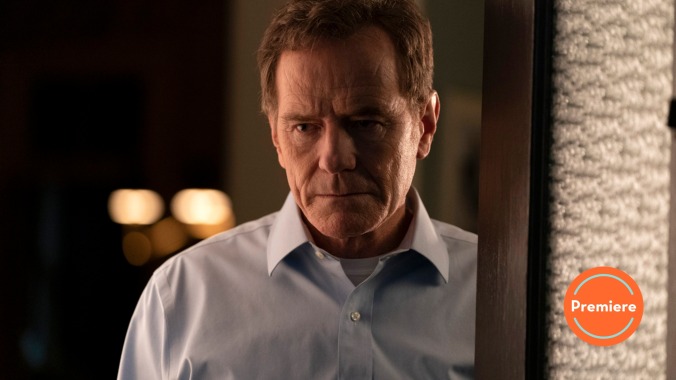Bryan Cranston brings familiar fatherly gravitas to the dour pulp of Your Honor


Based on the Israeli limited series Kvodo, the introductory installment of Showtime’s ten-episode Your Honor is a slow burn for what promises to be ten episodes of gradually bubbling prestige pulp. The setup sees Adam, the sensitive, vulnerable son of Bryan Cranston’s grieving New Orleans judge Michael Desiato, driving a lonely, pre-school pilgrimage to a Ninth Ward bodega, where his makeshift shrine of flowers and a framed photograph of his dead mother is greeted with looming hostility by some neighborhood residents. Anxious and asthmatic, the teenager (Truth Be Told’s Hunter Doohan) incurs a series of escalating distractions as he leaves the unfamiliar environs (a car that may or may not be following him, an inconveniently rollaway inhaler) until, gasping in accumulated fear, he plows brutally into another teenage boy on a motorcycle.
The boy dies. The injured son, after some dazed but not inconsiderable efforts to do the right thing, flees the scene, his subsequent attempts to cover his tracks dropping a multiplying trail of witnesses and evidence. When Cranston returns home from a day spent upholding his own high standards of justice (we see him elaborately upbraid a clearly lying white policeman trying to railroad a Black defendant), he’s confronted with the moral dilemma of trusting his own beloved son to the justice system he presides over every day. Your Honor hints here and there at a deeper underpinning of cultural and racial foundations informing its high concept. Apart from Cranston’s showy white knighting in his courtroom, there are hints of a racial component to the absent wife and mother’s death, with the son’s bodega pursuers portrayed as a faceless, skin-showing Black menace. And Cranston’s morning jog includes a surreptitious visit to scope out the shotgun layout of the defendant’s rundown house, where this unknown white man is confronted by the woman’s wary young son. In this first episode, Your Honor’s New Orleans is a dim, institutional wash of greens and blues, shadowy blacks and off-whites, its Ninth Ward so sparsely peopled as to render Adam’s daylight accident scene as believably witness-free as an Old West crossroads.
But Your Honor’s real dramatic heart is its big twist, where Cranston’s judge, driving his repentant son to turn himself in at the police station, realizes that the boy who died was the equally adored child of one Jimmy Baxter, who Cranston tells the confused boy as they speed away from the station, is “The head of the most vicious crime family in the history of this city.” Hustling the boy back inside their affluent home (Adam appears to have a guest house to himself, where we are introduced to him having secretly spent the night with his girlfriend, played by Sofia Black-D’Elia), the judge scours Adam’s rattly, DNA-spattered old Volvo, stuffs his son’s blood-soaked clothes in a laundry bag, and hurls them off a distant bridge, weighted down with bricks.
In practice, Your Honor takes its time setting this premise moving. Adam’s accident occurs ten minutes in, and lingers over the bloody aftermath in appropriately horrified detail, while we never learn Adam’s name until his father calls him by it halfway through the hour-long premiere. This deliberation is a nod toward the series’ prestige ambitions that, yet, plays out as requisitely attenuated to those lured in by the widely publicized hook, and the presence of Cranston. Cranston himself is kept at a distance for fully half the episode, focusing as it does on the legal and ethical trap into which Doohan’s Adam inextricably snares himself. We first see Michael obscured by a grey hoodie, jogging through the same sprawling, comparatively poor neighborhoods in which his son is about to get in trouble. “I’m training for a marathon,” he explains helpfully in court later, after showering in his office and donning his judicial robes, and Cranston, indeed, provides an intriguing initial sketch of a well-intentioned, conscientious judge and single father who views his dual missions in life as equally successful.
Again, by centering the crime story plot, however, a lot of this character and milieu-building comes off as the necessary dressing for what promises to be an eventual high-stakes showdown between two powerhouse actors. As mirror to Cranston’s Michael Desatio, Michael Stuhlbarg looks poised to match inevitable Emmy nods, as his Jimmy Baxter—introduced as the loving, jovial head of a close-knit family, gifting his son Rocco (Benjamin Wadsworth) that rare antique motorcycle—suggests a deep well of genuine love before the shocked Desatio later explains to us just how villainous he apparently is. Both Stuhlbarg and, as his similarly affectionate and seemingly content wife, Hope Davis, have comparatively little to do in this first outing, but the pairing augurs good things to come. Visiting the vacated scene of their son’s death at episode’s end, Stuhlbarg lends the compact, powerful Baxter a touching helplessness as his taller, elegant wife staggers on her expensive heels before melting down operatically by the still-bloody curb.
But Your Honor, from its on-the-nose clever title all on through this first episode, is all about setting the board for Desiato and Baxter to match wits, and it’s there that the series’ genre appeal shows some cracks. This first hour is essentially a game of spot the future obstacle, as potential complicating witnesses are established, unhelpful dogs hide bloody evidence and, in one especially tired twist at episode’s end, Baxter’s henchman (Tony Curran) pockets a clue at the accident site so incriminating as to suggest the series’ ten episode cat-and-mouse game will hinge on neither the New Orleans crime or law enforcement communities being very good at their jobs. The first episode of a mystery-themed series drops its own clues, and there are some worrisomely sloppy ones here.
Still, the prospect of Cranston and Stuhlbarg squaring off as a pair of matching, passionately devoted fathers willing to do anything for their sons is enough to encourage continued viewing. (The A.V. Club will be dropping in at series’ midpoint and for the finale.) Not to mention the aforementioned Hope Davis, alongside blink-and-you’ll miss him supporting player Isiah Whitlock Jr. as a glad-handing politician pal of the judge, and the not-yet introduced Carmen Ejogo, Margo Martindale, Maura Tierney, and Amy Landecker. Cranston, making some familiar-looking sweaty moves once his determined dad starts crafting a plan to save his family, is nimbly expressive as a very different kind of compromised patriarch than was Walter White. Watch the scene where, even as he urges the shell-shocked Adam to turn himself in, his principled judge starts shaping the narrative he knows will play best to the cops, and the courts. In his earlier courtroom theatrics, the judge hauls the defendant’s young son in front of the court to unseat the mendacious policeman’s story, but here it’s his own son who he subtly manipulates according to what he’s confident are the rules to the game.
Baxter’s involvement (sealed with a knowing police station glance between the two men so elongated as to fix Desaito’s face in the gangster’s mind irrevocably) changes the game though, at least in the quick-thinking judge’s mind. Conveniently, once home after disposing of his son’s mess, a news report shows the grieving Baxter promising, with unadorned menace, “Whoever you are, wherever you are, you should know, you will be found,” giving Cranston’s conflicted father a final lashing of reassurance that the path he’s heading down is for the greater good. Sitting down with his still-dazed boy for a traditional father-son re-watch of the exercise yard opera scene in The Shawshank Redemption, Cranston has his best, silent moments of this premiere. Watching the fairy tale within a fairy tale of illusory freedom from hellish imprisonment, Cranston’s Michael Desiato at first allows himself to be swept up in the moment, before his face registers just how hard real life is about to become.
Stray observations
- Your Honor has a fine pedigree, Executive Produced as it is by The Good Wife and The Good Fight’s Robert and Michelle King, and written by Peter Moffat, doing the same adaptation duties for Kvodo as Steve Zaillian and Richard Price did for Moffat’s BBC drama Criminal Justice on The Night Of.
- Hunter Doohan makes for an appropriately ordinary Adam, as the character’s own fateful bad choices are portrayed less as moral failings as an inescapable heap of bad fucking luck and unformed panic. That he’s asthmatic even girds his messy attempt to give the broken Rocco mouth-to-mouth with an exonerating, ineffectual saintliness.
- If there’s going to be more depth to Cranston’s own moral choices, it’s to come as he confronts his own self-satisfied navigation of the legal system. When Adam notices his father calling an attorney before they go to the cops, Desiato replies, “I won’t not do what is smart just because it’s my own son.”
- As to whatever happened to Mrs. Desiato outside that Ninth Ward convenience store, Your Honor’s own moral narrative complexities will be on the stand in the episodes to come.